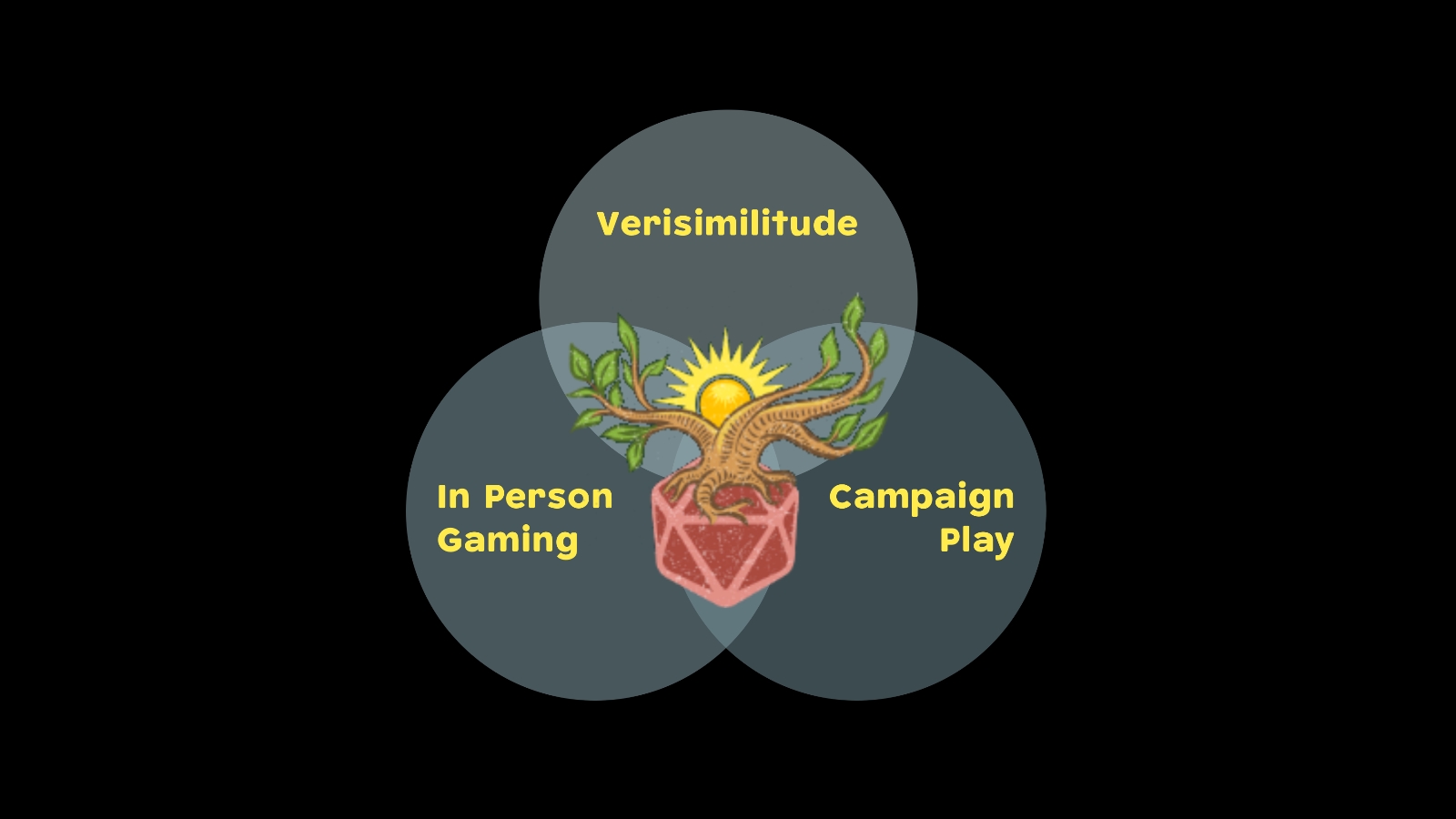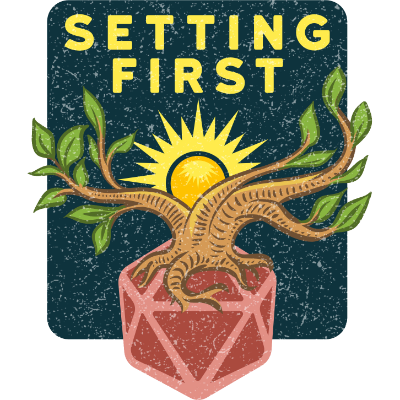
There is no One True Way to play tabletop RPGs, but Setting First is oriented around three particular approaches to play.
A Quick Intro
As I ramp up Setting First, I think it’s important to provide some context about my gaming roots, what led me to create Setting First, and what it’s about. You can either read the intro below or watch it in video form.
My Gaming Background
I’m a big believer in providing context where I can, especially since online communication is so often stripped of it. But I’ll be quick about it, since nobody wants to hear me blather on about myself at length (including me).
I discovered D&D in the winter of 1979-80 in junior high. From the get-go exploring new games as they came out was important for my gaming friends and I. At that time and place (early 1980s Northern California), interpreting rules as we saw fit and hacking them to suit our needs was just what you did. So I tend to get less hung up on whether rules as written are perfect or not, And I enjoy tweaking settings to fit my table’s needs.
We started with TSR games, playing short campaigns of AD&D, Top Secret, and, Gamma World. Early in high school I branched out to RuneQuest and fell in love with the world of Glorantha, running a lengthy campaign built around Chaosium’s published supplements. I was absorbing how Glorantha made magic feel intrinsic to a fantasy world, rather than bolted-on, and really enjoying how messy and real the relationships between cults felt,
I also went all in on the crunch of Aftermath, running multiple campaigns in a home-town post-apocalypse setting of my own design, and learning through trial and many errors how to make a game world feel like more than a collection of combat encounters.
When Shadowrun came along, as a reader of cyberpunk the pastiche of technology and magic instantly grabbed me. Our campaign started in college, but we loved the world and characters so much that we extended it for a time after college through our own flavor of play by mail.
I played and GMed lots of games along the way, and quite a few since then (including but not limited to):
- The Arduin Grimoire
- Traveller
- Mercenaries, Spies, & Private Eyes
- Teenage Mutant Ninja Turtles & Other Strangeness
- Stormbringer
- Cyberpunk
- Twilight: 2000
- Call of Cthulhu
- Numenera
- Burning Wheel
- Pathfinder
- Apocalypse World
- Dungeon World
- Fate Core & Fate Accelerated
- Twilight:2013
- Fiasco
- Tales from the Loop
- Paranoia
- Night’s Black Agents
- Mutant: Year Zero
- Conan: Adventures in an Age Undreamed Of
- Cyberpunk Red
- Mothership
From this list you can see I’ve mostly played traditional games but have tried a few that step outside that category.
Most recently I’ve run campaigns using:
- Basic Roleplaying, for a multi-generational zombie apocalypse of my own creation,
- Eclipse Phase,
- Star Wars Edge of the Empire and Age of Rebellion, and
- Degenesis (a game I’ve gotten so deep into that I fired up a blog all about it.
- At the moment I’m running a Paleomythic campaign.
Unpossible Journeys
For the last 13 years I’ve been running a site that was originally called Learn Tabletop RPGs, which became Unpossible Journeys. It’s a resource for existing gamers looking to try different kinds of games, and newcomers just entering the hobby. But with the rise of explanatory videos and streaming shows, the need for a site like UJ has diminished over time. I still enjoy experimenting with different games and play styles, but for Setting First I’ll focus on exploring the approaches to gaming that mean the most to me
Now We Arrive at Setting First
Primarily (but not exclusively) Setting First sits at the intersection of three areas of interest:
Verisimilitude
Defining what it is: Yes, it’s the feeling of “realness” in fiction, but there’s a lot to uncover and understand there. It’s about incorporating verisimilitude into our games as GMs and players. We’ll be drawing from outside TTRPG, from the realms of History, Anthropology, Economics, Psychology, and so on. And of course from fiction found in books, movies, TV, you name it.
Campaign Play
I’m drawn to campaigns that stretch on long enough to provide the immersion of a really good multi-series TV series (like The Wire, Deadwood, or the Battlestar Galactica remake). A good extended campaign really can deliver engagement in the setting, rich character development, and deeply rewarding adventures. This applies whether we’re talking about commercially-produced settings or homebrew.
In-person Gaming
For me and my primary gaming group of busy adults, the social benefits of gaming in person are more important now than ever. So I want to dig into how adult gamers can prioritize and coordinate in-person gaming, and talk about the benefits of in-person gaming and how we fit it into our busy lives.
There is No One True Way
In exploring these topics, I think about how tabletop roleplaying is an inherently worthwhile hobby. It’s not “just a silly game”, and is worth of as much respect as being a movie buff, an NFL fan, or going to concerts. With that in mind, Setting First is not about espousing any sort of One True Way.
I enjoy looking at things from different angles, and sharing ideas with people who don’t think about things exactly as I do, so this is not a space for rants, provocations, or drama. It is a place for mutually respectful, mutually-beneficial sharing of our wonderful hobby. More than anything I’m looking to find other gamers whose interests and approach to tabletop roleplaying intersect with mine, so we can share with and benefit from each other.
One Last Note
There are plenty of channels for D20 classes-and-levels games like D&D, Pathfinder, and D&D retroclones. That’s not really my interest, so don’t expect much material explicitly focused on those games. That said, it bears repeating that Setting First isn’t about bashing games or playstyles; it’s about exploring a kind of gaming that I find enjoyable and rewarding.
Setting First Beyond This Blog
- YouTube
- Discord (Note that this is the Unpossible Journeys Discord, but is absolutely the place to talk about all things Setting First-related)
Ω

